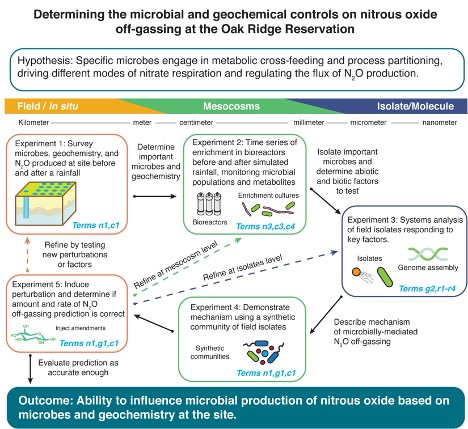
A Holistic Modeling Framework Integrating Laboratory and Field Studies for Microbial Ecology.
The Science
Microbial communities serve critical roles in all ecosystems and have a profound impact on human health, environmental health, and industrial capabilities. As such, it is desirable to have robust, actionable directions for intervention of microbial community function. However, the multiscale, stochastic, spatio-temporal, and diverse nature of microbial processes makes it difficult to achieve predictive understanding of microbial systems, despite the large body of microbial ecology research. To aid efforts that are building predictive understanding from genes to ecosystems, we have developed a conceptual modeling framework (FICSME) that models the composition, function, and ecological processes of microbial communities and environmental components at different scales (e.g., genes, individuals, populations, communities, and ecosystems) combined into an encompassing continuum between field and laboratory studies.
The Impact
This framework incorporates the foundational work that others have done to model microbial ecology processes and will help microbial ecologists (1) develop hypotheses, (2) determine measurements needed for focused sampling, laboratory efforts, and reduced analytical burdens, (3) discern processes to capture in their study, (4) incorporate results from other studies, and (5) plan long-term projects for developing technologies and gaining a holistic and predictive understanding of their system. Using a framework for experimental planning helps bridge theory and data for predictive and mechanistic understanding of biological processes. Combined utilization of this framework will overcome current barriers in microbial ecology, allowing for discovery and refinements phases to be iterated leading to a more process-focused predictive outcome.
Summary
Over the last century, leaps in technology for imaging, sampling, detection, high-throughput sequencing, and ‘omics enable rapid acquisition of extensive datasets for microbial communities across the ever-increasing temporal and spatial scales. The present challenge is capitalizing on our enhanced abilities of observation and integrating diverse data types from different scales, resolutions, and disciplines to reach a causal and mechanistic understanding of how microbial communities transform and respond to perturbations in the environment. This type of causal and mechanistic understanding will make predictions of microbial community behavior more robust and actionable in addressing microbially mediated global problems. To discern drivers of microbial community assembly and function, we recognize the need for a conceptual, quantitative framework that connects measurements of genomic potential, the environment, and ecological and physical forces to rates of microbial growth at specific locations. Framework for Integrated, Conceptual, and Systematic Microbial Ecology (FICSME) is an experimental design framework for conducting process-focused microbial ecology studies that incorporates biological, chemical, and physical drivers of a microbial system into a conceptual model. Through iterative cycles that advance our understanding of the coupling across scales and processes, we can reliably predict how perturbations to microbial systems impact ecosystem-scale processes or vice versa.
Contact
Adam P. Arkin
Professor, Department of Bioengineering, University of California, Berkeley
Senior Faculty Scientist, Environmental Genomics and Systems Biology Division, Lawrence Berkeley National Laboratory
CEO/CSO, DOE Systems Biology Knowledgebase
Lui, Lauren M.; E. L. Majumder, H.J. Smith, H.K. Carlson, N.S. Baliga, F. von Netzer, M.W. Fields, D.A. Stahl, J-Z. Zhou, T.C. Hazen, P.D. Adams, A.P. Arkin (2021) Mechanism across scales: a holistic modeling framework integrating laboratory and field studies for microbial ecology. Frontiers in Microbiology. [doi]:3389/fmicb.2021.642422OSTI ID: 1773742
